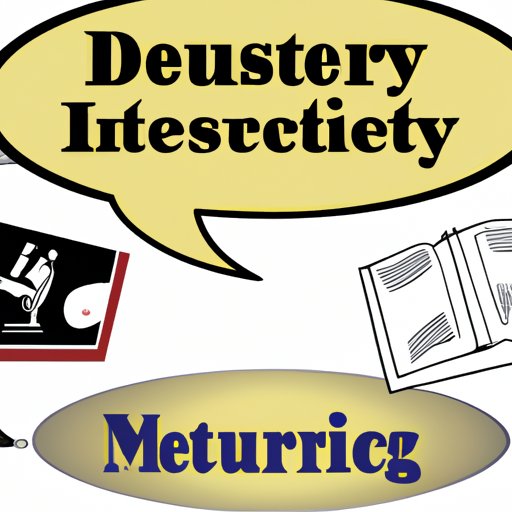Introduction: Is History a Science or an Art?
The debate as to whether history is a science or an art has been ongoing for centuries. On the one hand, some believe that history is best studied using the scientific method, which involves collecting data, forming hypotheses, and testing theories. On the other hand, others argue that history is more akin to an art form, relying on creativity and interpretation to uncover its secrets.
Overview of the Debate
At its core, the debate over whether history is a science or an art centers around how history should be studied. Proponents of the scientific approach argue that history is best studied using the same methods employed by scientists in other disciplines. This includes collecting data, forming hypotheses, and testing theories. By doing so, they believe it is possible to uncover the “truth” about past events.
On the other side of the debate are those who view history as an art form. They argue that history cannot be studied in the same way as other sciences, and instead relies on creativity and interpretation to draw meaningful conclusions. From this perspective, historians must consider a variety of sources, assess the impact of bias and perspective, and analyze facts, context, and narratives in order to gain an understanding of the past.

Examining the Scientific Approach to Studying History
Proponents of the scientific approach to studying history believe that it is possible to uncover the “truth” about past events. To do this, they employ the same methods used in other scientific disciplines, such as collecting data, forming hypotheses, and testing theories. For example, a historian might use archaeological evidence to form a hypothesis about a particular event, then test that hypothesis by examining other sources such as primary documents, oral histories, and written records.
This approach has several advantages. For one, it allows historians to draw conclusions based on empirical evidence rather than guesswork. It also gives them the ability to make predictions about future events based on past patterns. Finally, it helps to reduce the influence of personal biases on the study of history.

The Role of Creativity and Interpretation in Historical Research
While the scientific approach to studying history has many benefits, it also has its limitations. For one, it can be difficult to form accurate hypotheses without considering the broader context of a situation. Additionally, it can be difficult to draw meaningful conclusions from incomplete or biased sources. In these cases, a more creative approach may be necessary.
In order to gain a more complete understanding of the past, historians must consider a variety of sources. These sources can include primary documents, oral histories, written records, and archaeological evidence. By looking at multiple sources, historians can gain a more comprehensive picture of the past and uncover new insights.
Historians must also consider the impact of bias and perspective when interpreting sources. A source may contain factual information, but it is also likely to be influenced by the author’s own views and experiences. As such, it is important to take into account the potential for bias when assessing a source.
Finally, historians must be able to analyze facts, context, and narratives in order to draw meaningful conclusions. This requires a certain level of creativity, as historians must be able to look beyond the facts and consider the implications of their findings.
Evaluating the Benefits and Limitations of Both Approaches
Both the scientific and creative approaches to studying history have their advantages and disadvantages. The scientific approach has the benefit of allowing historians to draw conclusions based on empirical evidence rather than guesswork. However, it can be difficult to form accurate hypotheses without considering the broader context of a situation, and incomplete or biased sources can lead to inaccurate conclusions.
The creative approach offers historians the ability to draw meaningful conclusions from a variety of sources. However, it can be difficult to separate fact from opinion when interpreting sources, and personal biases can influence the interpretation of evidence.
Ultimately, the decision as to which approach is best suited to the study of history will depend on the specific circumstances. In some cases, a purely scientific approach may be the most effective, while in others a more creative approach may be necessary.
Exploring How the Debate Changes Over Time
The debate over whether history is a science or an art has changed over time. In the past, the scientific approach was seen as the only acceptable way to study history. However, in recent years, there has been a shift towards viewing history as an art form, with more emphasis being placed on creativity and interpretation.
For example, the rise of digital humanities has made it easier for historians to access and analyze large amounts of data. This has allowed them to draw more nuanced conclusions about the past, incorporating elements of both the scientific and creative approaches.

Conclusion: Considering the Complexity of the Debate
The debate as to whether history is a science or an art is complex and ongoing. On the one hand, proponents of the scientific approach argue that history is best studied using the same methods employed by scientists in other disciplines. On the other hand, those who view history as an art form believe that creativity and interpretation are essential to uncovering its secrets.
Ultimately, both approaches have their advantages and disadvantages, and it is up to the individual historian to decide which approach is best suited to the study of history. As the debate evolves over time, it is likely that the two approaches will continue to be used in tandem, allowing historians to draw more nuanced conclusions about the past.
(Note: Is this article not meeting your expectations? Do you have knowledge or insights to share? Unlock new opportunities and expand your reach by joining our authors team. Click Registration to join us and share your expertise with our readers.)
